Indonesia Probes Elite Officers As Stadium Disaster Death Toll Rises
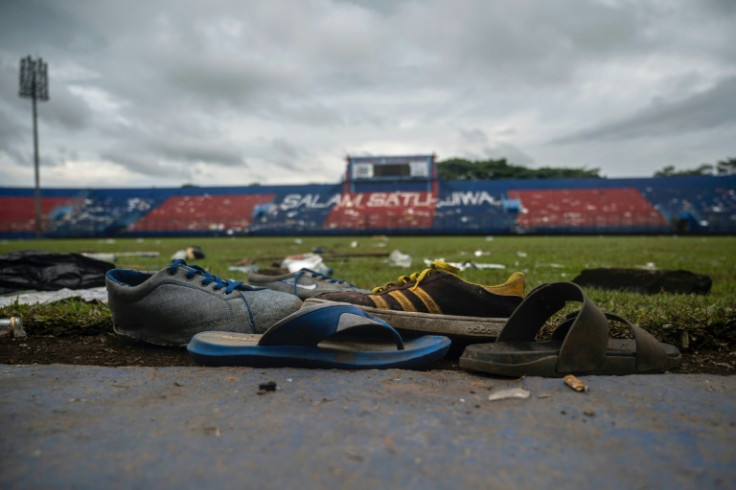
Elite Indonesian police officers were under investigation Tuesday over a stadium stampede that killed 131 people including dozens of children in one of the deadliest disasters in football history.
As public anger grew, police moved to punish those responsible for the crush in the city of Malang that witnesses say started when officers fired tear gas into packed stands to quell a pitch invasion.
"As the regional police chief, I am concerned, saddened and at the same time I am sorry for the shortcomings in the security process," East Java police chief Nico Afinta told a press conference Tuesday.
The terraces of the Kanjuruhan stadium were packed Saturday evening with 42,000 "Aremania", or Arema FC fans, for a match against fierce rivals Persebaya Surabaya.
But after a 3-2 defeat, the first home loss for more than two decades to their adversaries, fans streamed down to the pitch to confront players and management.
Police described the incident as a riot and said two officers were killed, but survivors accused them of overreacting.
Officers responded to the pitch invasion with force, kicking and hitting fans with batons, according to witnesses and video footage, pushing fans back into the stands where many would be trampled or suffocate to death after the tear gas was fired.
"If there was a riot, (tear gas) should be fired to the pitch, not in the stand," Danny Agung Prasetyo, coordinator of supporter group Arema DC, told AFP.
The death toll jumped again on Tuesday with local health official Wiyanto Wijoyo telling AFP six more victims had succumbed to their injuries.
Police said the investigation was focusing on six gates at the stadium using CCTV footage from cameras placed outside them. It said the exits were open but too small for the crowds attempting to pass through them.
"Those six gates were not closed but they were very narrow. Their capacity is for two people but the people coming out were hundreds," national police spokesman Dedi Prasetyo said.
But witnesses said some of the stadium's doors were shut, leaving those who could not scale large fences at the mercy of the crush as tear gas rained down.
"The doors were closed, that's why people were pushing. Some lay down in the corner" by a closed gate to try to escape the crush, a 16-year-old survivor of the chaos told AFP.
The Malang police chief was replaced Monday, nine officers were suspended and 19 others were put under investigation over the disaster in the stadium, which was filled with only hometown Arema FC fans, Prasetyo said.
He said those suspended were members of the Mobile Brigade Corps, or Brimob, a paramilitary unit for the Indonesian police force notorious for its aggressive crowd control tactics.
Indonesia's football association also moved Tuesday to sanction Arema FC, banning its organising committee chairman and a security officer from football for life and fining the club 250 million rupiah ($16,000).
Arema FC fans set up an outdoor stall in Malang Monday to receive legal complaints.
They said they would file a lawsuit against officers for causing scores of deaths by indiscriminately targeting spectators in confined terraces.
The Indonesian government suspended the country's national football league and announced a task force to investigate the tragedy. It said the probe would take two to three weeks.
Calls for an independent investigation have grown since details of the stampede started to emerge over the weekend.
"There is no instruction to fire tear gas," Albertus Wahyurudhanto, a commissioner of the National Commission of Human Rights (Komnas HAM), told a press conference Tuesday.
Fan anger was displayed outside the stadium where a police truck was torched and the walls were daubed with graffiti that read "Tear gas vs mother's tears" and "Our friends died here".
More vigils were planned in Malang on Tuesday after fans and Arema FC players gathered outside the stadium a day before to lay flowers at the scene and pray for the victims.
Among the dead were 32 children, a women's empowerment and child protection ministry official told AFP, adding that the youngest was aged three or four.
FIFA's safety guidelines prohibit the use of crowd control gas by police or stewards at pitchside.
Gianni Infantino, president of football's global governing body, called the tragedy a "dark day" for football, while UEFA said a minute's silence would be observed at this week's European matches.
Brazilian superstar Pele expressed his condolences and said "violence and sports do not mix".
But fans said they were not to blame.
Everything that could go wrong at a football match appeared to do so on Saturday night, culminating in a disaster never seen before in an Indonesian stadium.
"You could see and sense that something bad could potentially happen," Indonesian football pundit Pangeran Siahaan told AFP.
"There's a lot of dangers every time you go into a football stadium in Indonesia."
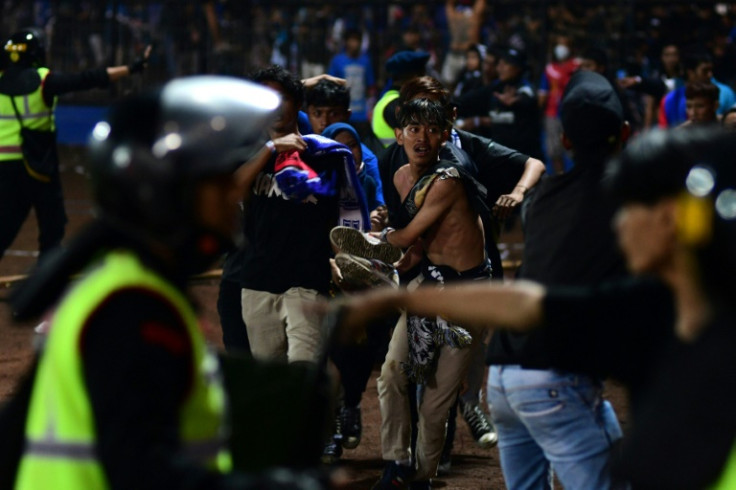
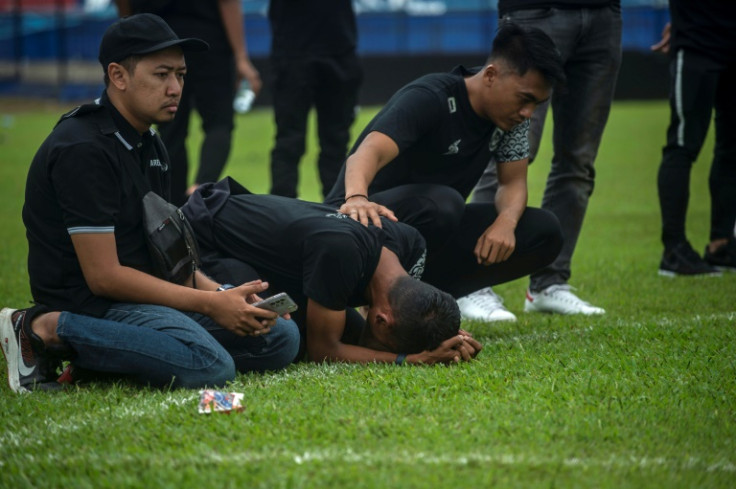
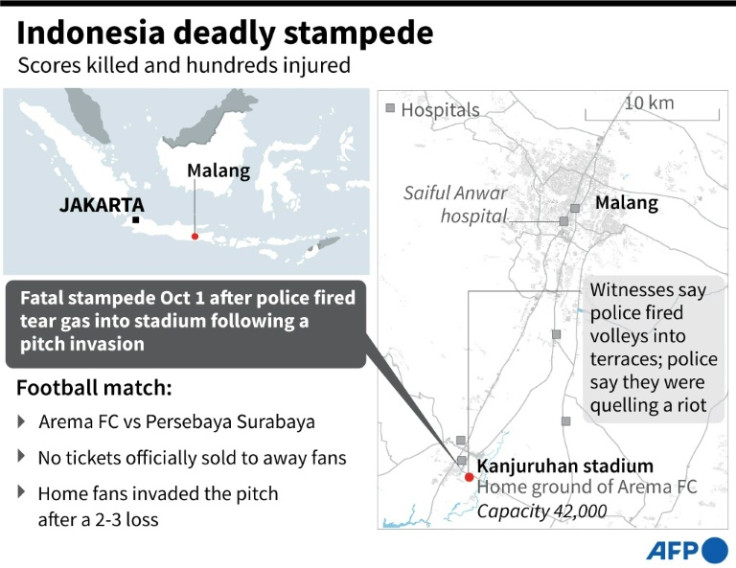
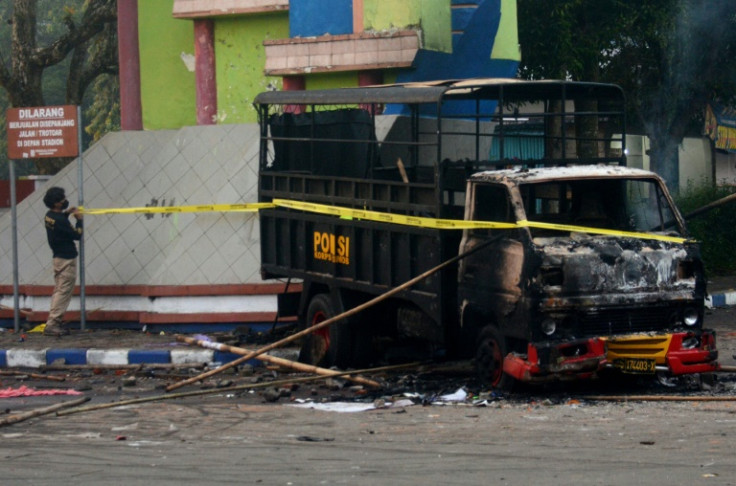
© Copyright AFP 2024. All rights reserved.











